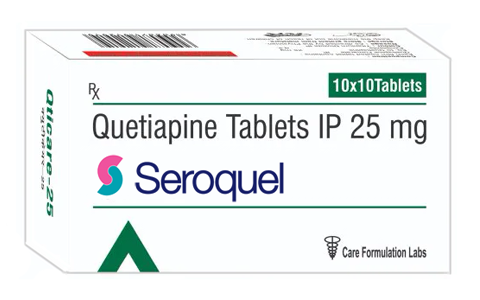Buy Seroquel (Quetiapine) Online safely with Discount

| Product Name: | Seroquel (Generic Quetiapine) |
|---|---|
| Doses: | 25mg, 50mg, 100mg, 200mg, 300mg |
| Prices: | $ 0.61 – Per Pill |
| Where To Buy Online | OnlinePharmacy |
|
When Seroquel may be prescribed? Seroquel, known generically as Quetiapine, is primarily prescribed for the treatment of certain mental/mood conditions. Its main uses include:
The decision to prescribe Seroquel is based on a thorough evaluation of the patient's medical history, current symptoms, and response to other treatments. As with any medication, the potential benefits must be weighed against possible side effects. What exactly does Seroquel do? Seroquel, or Quetiapine, is an antipsychotic medication with several mechanisms of action that contribute to its effectiveness in treating various mental health conditions. Detailed look at its functions:
Seroquel does not cure these conditions but rather helps to manage symptoms. The exact way Seroquel exerts these effects is complex and involves multiple pathways in the brain. Its use, therefore, needs to be closely monitored by healthcare professionals to ensure efficacy and safety for each individual patient. In what forms and dosages Seroquel is available? Seroquel (Quetiapine) is available in various forms and dosages to accommodate a range of treatment needs:
The specific dosage and form of Seroquel prescribed can vary greatly depending on the individual’s medical condition, response to treatment, and other factors. The immediate-release tablets are generally taken two or three times a day, while the extended-release tablets are usually taken once daily. How to Use Seroquel? Schizophrenia in Adults:
Schizophrenia in Adolescents (Ages 13-17):
Bipolar Disorder (Manic Episodes):
Bipolar Depression:
General Guidelines:
How long does it take for Seroquel to work? The onset of action and the time it takes for Seroquel to work can vary depending on the individual and the condition being treated. For symptoms of schizophrenia and bipolar disorder, patients may start to notice improvements in sleep, appetite, and energy levels within the first 1-2 weeks of starting treatment. However, it might take longer, typically several weeks, to observe the full therapeutic effects on mood stabilization and reduction in psychotic symptoms. In the treatment of major depressive disorder, as part of a combination therapy, it may take up to 6 weeks to experience the full antidepressant effects. It's important to note that response to treatment can vary significantly between individuals. It's crucial for patients to adhere to the prescribed dosage and consult their healthcare provider regularly to monitor the effectiveness and adjust the treatment as necessary. Any changes in the medication regimen should be done under the guidance of a healthcare professional. What is the most serious side effect of Seroquel? While Seroquel has several potential side effects, one of the most serious is the risk of developing tardive dyskinesia (TD). Tardive dyskinesia is a condition characterized by involuntary, repetitive body movements. This can include grimacing, tongue movements, lip smacking, and rapid movement of the arms and legs. It is often irreversible, even after stopping the medication, and can be debilitating. While TD is particularly serious, Seroquel is also associated with other significant side effects, including:
Comparing Seroquel with other antipsychotic medications When comparing Seroquel (Quetiapine) to other antipsychotic medications, it is important to consider several aspects, including their efficacy, side effect profiles, and their usage in treating specific conditions. Efficacy:
Specific Conditions:
Dosage and Administration:
Cost and Availability:
Seroquel patient experiences and clinical insights Seroquel (Quetiapine) has received a range of experiences from patients, with many reporting positive outcomes, especially in the treatment of bipolar disorder, insomnia, and schizoaffective disorder. Several patients with bipolar disorder noted significant improvements in their condition after taking Seroquel. One patient mentioned it helped with mood swings, anxiety, and insomnia, while another highlighted its effectiveness in controlling severe depression, enabling them to work and lead a more stable life. The medication's ability to provide a full night's sleep was particularly valued by patients who had struggled with chronic insomnia for years. Some patients did report weight gain as a side effect, but overall, the benefits in mood stabilization and improved sleep were emphasized. Patients with schizoaffective disorder shared that Seroquel effectively managed their symptoms, including paranoia and delusions, with one patient mentioning it was the only antipsychotic that did not cause intolerable side effects like akathisia. The rapid onset of improvement, sometimes within days, was noted as a positive aspect of the medication. For those suffering from insomnia, Seroquel proved to be a life-changer for many. Patients who had tried various treatments without success found that Seroquel enabled them to have predictable and solid sleep. While some experienced morning grogginess and needed to adjust their morning routines, the trade-off for a good night's sleep was deemed worthwhile. Seroquel (Quetiapine) has been found to positively impact the quality of life for many individuals, particularly those suffering from major depressive disorder and related conditions like insomnia or psychosis. Additionally, Seroquel has been observed to improve cognitive functioning in individuals with major depression. This is particularly important since cognitive impairments, such as difficulties with memory, attention, and executive functioning, are often experienced in depression. By improving these cognitive aspects, Seroquel can lead to better overall functioning and a higher quality of life. |

